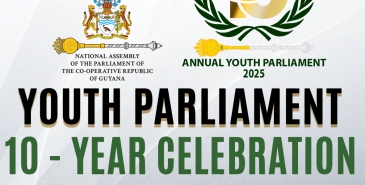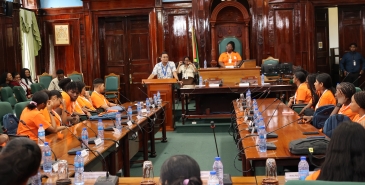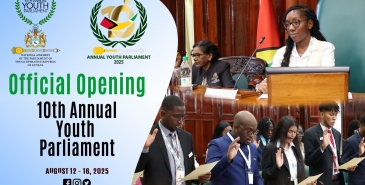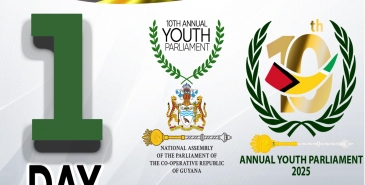Restoration of the Annual Subvention/Grant to the Critchlow Labour College
Speech delivered at: 70th Sitting - Tenth Parliament - 27 February, 2014
27 February, 2014
6143
Deputy Speaker [Mr. B. Williams]: Why do these Members always say “Oh Lord” when I am about to speak? Mr. Speaker, it is becoming disconcerted. Whenever I rise to speak there is always the words “Oh God” over there. On the last occasion it was the Hon. Attorney General and now it is the Hon. Minister of Housing and Water. What is happening? I do not wish to challenge God on earth. Thank you very much.
We are dealing with a matter that is very dear and close to my heart. We need to recognise that lost in all of this is that Critchlow Labour College really is the brainchild of the national hero of Guyana. That man was made a national hero right here in this hallowed House, by all sides, Hubert Nathaniel Critchlow. It is important that we look to the genesis of this college.
Critchlow fought for the education, not only of himself, but for his protégées. His life work, the core running through his life’s work, was education - education for the people, education for the trade union workers. He first introduced this concept of workers’ education. He initiated a trade union education when he arranged correspondence courses with Ruskin College in Oxford England. People in the likes of Mr. Ashton Chase studied at that college because of Critchlow’s work.
Critchlow established firm links which are in existence today for local trade unionist to obtain training in industrial relations and related topics. Critchlow was insatiable widening his education and knowledge about trade unionism and he also bestowed that on other persons around him in that movement.
We must recognise that this trade union movement of Guyana was a movement which was tantamount to living history because this movement evolved since it was Critchlow being the one who organised the first trade union in the entire commonwealth. When we read the history of the commonwealth movement and the way the politicians entered the movement, where Critchlow was and all of the ideals of him, we would have found to be adopted by a lot of our politicians.
As Critchlow strove for betterment of the workers in Guyana it went hand in hand with his quest that they be educated. He was untiring in his efforts to establish education in all of the territories too and, even though during those strife with his union, he never lost sight of the need to have education placed on a firm footing in this country. [Mr. Benn: Who wrote it for you?] Do you wish to have the source? [Mr. Benn: Yes.] Ask me nicely.
This relationship that he had in the Guyana trades union movement with the leaders of the trades union movement eventuated with a very close relationship with him and Linden Forbes Sampson Burnham. It was because of Burnham and his party many of the ideas of Critchlow saw the day of light. The aspirations of Critchlow and ideas he fought for eventuated. It was Burnham’s administration which, upon assuming the range of coalition government in 1964, established the Critchlow Labour Institute as a trade union educational institution on the 12th October, 1967.
This issue of equitable sharing on the board of management of Critchlow Labour College is not the sine qua non of the struggle but we are going into the genesis. He named it after Hubert Nathaniel Critchlow and it was then situated at South Road and New Garden Street. In 1968 the Critchlow Labour Institute was shifted to its permanent location on Woolford Avenue and was renamed Critchlow Labour College and was official opened in 1969 by the then Prime Minister L.F.S. Burnham himself. The first principal of that college was one Max Swerdlow. Is that known, Dr. Gopaul? [Hon. Member (Government)]: You are now reading it.] I am now reading it. He was a Canadian born International Labour Organisation adviser on labour education. [Mr. Benn: Now you are discovering that.] You want to know my source. Might I respectfully refer the Hon. Member to the Hansard of Wednesday, November 2005. Let me see who the presenter was. The presenter was Mr. Basil Williams.
The long-term objective of the Critchlow Labour College was to upgrade it to a community college. This noise that some of the speakers on the other side are making... The Critchlow Labour College now offers courses which provide its students with necessary skills to proceed for vocational and tertiary level training. That is what this withdrawal affects. [Mr. Neendkumar: We know all of that.] You knew that. [Mr. Neendkumar: We know all of that.] Did you go there? [Mr. Neendkumar: [Inaudible]] You should have gone there. Even as a second string you could not have made it. These courses include a one-year programme in industrial relations and social studies, short courses in industrial relations and labour economics, communication and effective speaking, clerical office practice and supervisory training, business management and accounts, to name a few, but it is just to show you how this college was oriented. It is obvious to note the hundreds of graduates from the University of Guyana who had pre-qualified for entry thereto by graduating from the Critchlow Labour College.
At every public meeting he held, Critchlow promoted technical and vocational training. In tribute to Hubert Nathaniel Critchlow the Guyana Industrial Training Centre was also built. Did you know that? It was administered by the Guyana Trades Union Congress with financial aid from the American Institute for Free Labour Development.
In 1978, Mr. Winslow Carrington, the director of Critchlow Labour College and coordinator of the workers education, announced that the workers coordinating centre and secretariat would have held classes specifically for trade unionist. All of this was under the aegis of the People’s National Congress Reform (PNCR).
As it was said earlier, the Constitution gives recognition to the status and role of trade unions in Guyana and in the 1980 Constitution it is by article 149. That is where we are in relation to the antecedent of the Critchlow Labour College. [Mr. Neendkumar: Antecedent?] You do not know that word.
We come now to what really is a sine qua non, another causa causans of this problem. This problem has nothing to do with accountability and how many numbers and equal numbers should be on the board of management. It has to do with something my brother talks about all of the time - control freakism. One wonders why the venerable trade unionist in this House is not speaking tonight. He is none other than the Hon. Member Mr. Komal Chand.
I recall vividly, as I said, that the trade union movement is something that one could have reached out and touched. A lot of the actors are still around. I recall in the 1980s the trade union movement was fought out on the floor of that Critchlow Labour College auditorium. In 1983, as a young attorney-at-law, I was introduced in that arena and what a stellar cast it was. There was the entire politburo of the People’s Progressive Party (PPP) on that floor - both Presidents Jagans, the current President, even the former President or the most recent former President, the Hon. Member Mr. Komal Chand. There were some stalwarts in the movement such as Gordon Todd, Samuel Walker, T. Anson Sancho and K. W. E. Denny. There was a mixture. There was Elvin Mc David; there was Robert Williams. That was the flow because all of the politicians were in GAWU and that is where we were. There was the association of masters and mistresses. What was one of my first exercises? It was to understand, to a T, the Constitutions of all of those unions affiliated to the Guyana Trades Union Congress. I can tell what the struggle was.
There was GAWU there, yes, the largest union, but there were unions such as Guyana Public Service Union (GPSU). There were large unions such as the Guyana Teachers’ Union and there were many smaller unions, but the delegate representation was all there written in law. It was the law and so what played out was that GAWU was struggling to get the control of the Guyana Trades Union Congress executive. I remembered this vividly. [Mr. Benn: You were there.] I was there. I had just come in fresh as a rose, observing. There were always frustrated by the fact that GAWU could have not gained control of the Guyana Trades Union Congress.
I recall, also, at the second elections, which I witnessed, the Hon. Member Mr. Komal Chand had a discussion with me and I suggested to him that getting the presidency, perhaps the GAWU could have started as an executive committee (EXCO) member. He would remember that he agreed but he had to, of course, go back to his superiors. I did not have to go back to my superiors because my superiors gave me the reins to negotiate. The Hon. Member Komal Chand will tell you that as a result of our agreement GAWU got, I think it was, the position of Assistant Secretary that year. It got a position and not just an EXCO position, but it got an officer position.
It never was satisfied and shortly after that there was the split in the movement. This issue about accountability and all of that... Let me show why it is a burning issue until now by quoting none other than Dr. Nanda Gopaul. The Hon. Member in his presentation tonight said that the governance of the Guyana Trades Union Congress, and he was saying the rules governing elections,... That is what he spoke about tonight and he lamented about the lack of proportionality since 1975. Those are his words and that is an issue which has been a burning one since 1975.
GAWU, with the largest number of members, could not have got the presidency. That was his lament here tonight. I do not know why the Government Members are telling me about equal numbers on the board. Then the Hon. Member brought in his own union, National Association of Clerical, Commercial and Industrial Employees (NACCIE) and neither NACCIE could have got a position, and a control position the EXCO.
We would never able to get control of critical positions in the Guyana Trades Union Congress. Those are the real reasons for punishing the children of Critchlow Labour College. It was not this issue about accountability. The Hon. Member Dr. Roopnarine told us that all the reports were submitted under his watch. Why is Dr. Gopaul telling us tonight, for decade, that there was no accountability? Dr. Roopnarine set the record straight.
The Hon. Member continued, in regaling this House, in his lamentations, that four unions with less numbers have all being allocated more delegates. It is crying; it is paining; it is burning, but they ought to have fought that battle out there in the GTUC and tried to get the rules reformed. I will tell the Member something else, when we come down to the president, about what he is talking about that it is a simple matter of getting four here and four there.
We come to the situation where there was another spilt. Dr. Roopnarine spoke about that split coming in the first decade of the 21st century. What happened during the last decade? The last decade had seen the decimation of the Guyana Trades Union Congress. There has been an unrelenting attack on the trade union movement. A slew of legislation came through this House emasculating the Guyana Trades Union Congress and virtually perpetrating the split in the movement. [An Hon. Member (Government): [Inaudible]]. There was always workers participation in management but then there was the Trades Union Recognition Board, a certification board. Its representation always has the Guyana Trades Union Congress on it. It was the classic standard bearer for an umbrella organisation for trade unions and the legislation was passed to exclude it. Legislation was passed in this House to exclude the Guyana Trades Union Congress from being consulted on matters of trade union interest.
When one hears that the people, right now, in Guyana Trades Union Congress try to protect their turf one has to understand because a lot of legislation has been passed to weaken and cripple them. [Ms. Teixeira: Give one.] I just give you one. It just cannot be a simple thing of putting four there and four here. There is still FITUG. We have been always calling for a unification of the movement. What happened? At the annual representation in Geneva, ILO Conference, the representatives are normally from the Guyana Trades Union Congress. What was found happening 2004/2005 and onwards to now? FITUG has being substituted in the place of the Guyana Trades Union Congress. In other words, efforts have been made to sidetrack the Guyana Trades Union Congress and to assert the FITUG organisation. All these factors have to be known when we talk about… When one understands all of this one understands that to the People’s Progressive Party the students of the Critchlow Labour College are mere collateral damage.
Let me say this: We are now in the situation where we are faced with Minister… - I happen to be in this House - Mr. Henry Jeffery, Dr. Bisnauth and the Hon. Member Manzoor Nadir. The last Member, Sir, we would require the entire session to deal with his tenure and I was surprised that he got up to speak because he was the only Minister of Labour that any motion of no confidence has moved against. It is under his watch that a foreign company actually had a manager lifting a spade to beat our worker so that they could get on with the job. It is under his watch that a foreign company be purported to derecognise the union that it was certificated for recognition with that workplace. I do not know how the Hon. Member Mr. Manzoor Nadir could have got up here and talked about any trade union matter.
Let me tell the Member that I believe personally that the Hon. Member Dr. Gopaul is a true blood trade unionist. If not only for the fact that when the honourable founder leader of this country, L.F.S. Burnham, was driving by he was one man… I have seen him… [Mr. Nandlall: Has found this country?]. That is another discussion but I would not be sidetracked. I want you to know that the Hon. Member Dr. Gopaul I saw when Mr. Forbes Burnham stopped him with his retinue - his full retinue - this Member here and he waited for him to run to the car and to go and sit inside with him. It is this same Hon. Member Dr. Gopaul.
Mr. Speaker: Dr. Gopaul, this would be the appropriate time to get up to clarify…
Mr. B. Williams: In my mind, if the Hon. Prime Minister and President could have stopped to collect Dr. Gopaul to ride with him, nothing could be wrong with Dr. Gopaul. That is my view. I am telling the Members that when he went into the Office of the President something had happened to him, but I am happy he is out of there now. Since he is here I know he is struggling because in his heart he knew that some terrible blows had been inflicted under the watch of the Hon. Member Manzoor Nadir against his movement and that is why we have seen some striving voices are now merely muted as they are working with him to try to reassert the movement. We believe that he would genuinely be interested in reunifying this movement, but we know who his masters are. We urge him to continue pressing but he has a lot things to do. He has to resolve the RUSAL matter. We are not going to bring a notice of no confidence within a month but we expect that he would get on with it so we would not have to do it in another two months or three months.
Where we are now with the restoration of the subvention? As I said, one Minister would say we have to wait for trade union unity, another one would say accountability and we knew that they are not being serious. What was seen next? GAWU had its own school. The Guyana Public Service Union (GPSU) had to follow suit, but we are saying Critchlow Labour College is not any ordinary institution. It is a truly indigenous institution, an institution which is really a product of struggle through colonial times, struggle through the hardships of which this country endured and we really should put it in a special place. If it comes to that, I am prepared to move an amendment to resolve that a Special Select Committee of this honourable House be established to examine the issue surrounding the restoration of the subvention to the Critchlow Labour College.
Right in this House, let us set up a Special Select Committee and let us bring in the parties, and let us see who is genuine from who is not. This is a challenge; I am challenging the Members. If the Hon. Member, my namesake, Mr. Trevor Williams, is in agreement we would put this forward because it is then we will see…
Mr. Speaker: Mr. Basil Williams, why should your amendment not look at the gamut of where trade unionism is today rather than just the issue of…?
Mr. B. Williams: I am guided.
Mr. Speaker If you are having a Special Select Committee we really need to examine where the unions are or…
Mr. B. Williams: Mr. Speaker, I agree with you.
Mr. Speaker: You may chair it.
Mr. B. Williams: I am dealing with it in this context but the trade union movement needs to be inquired into and examined.
We are saying all that the speakers before me have spoken to the real persons who are being injured in this struggle between the giants. The struggle between FITUG and GTUC, the struggle on the part of the PPP/C to control the trade union movement because of nightmares it has of the movement from the 1960s and even those issues were disputed but it has this fear. We have to recognise that this is a real fear and that is why we need to sit and talk. We need to have all sides sit and list it here at this level. I am inviting Members to come with the memorandum and make presentations and let us find a way out of this. The Critchlow Labour College is too important to us to fail. We guarantee the Members, on this side of the House, that we would do our best to foster any unity movement, any restoration of the unity of trade union movement, and the subvention to Critchlow Labour College.
I support the motion moved by the Hon. Member Trevor Williams and to say that the APNU stands firmly behind this movement and the quest for the restoration of the subvention for the Critchlow Labour College.
Thank you very much. [Applause]
Speech delivered by:
What's New

17 August, 2025
10th Annual Youth Parliament Closes: Celebrating a Decade of Impact, Excellence, and Youth Empowerment10th Annual Youth Parliament Closes: Celebrating a Decade of Impact, Excellence, and Youth Empower

13 August, 2025
Youth Parliamentarians Assemble for Grand Rehearsals for the 10th Annual Youth Parliament

12 August, 2025
10th Annual Youth Parliament Kicks Off – Young Voices, Bold Ideas, Bright Futures!

11 August, 2025
10th Annual Parliament Kicks off tomorrow

